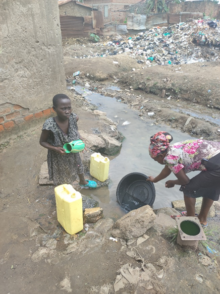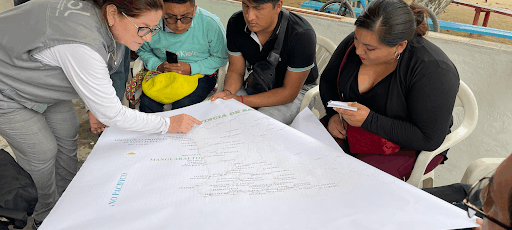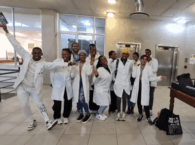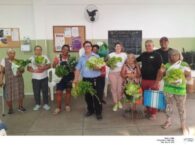Collaboration for Change: Empowering Communities through EPIC-Africa Partnership in Uganda
Metrics
Community
Mbale cityCommunity Size
96,189University
University of MakerereCase Type
Partnership StoriesRegion
AfricaEPIC-Africa’s growing program partnership with Uganda, co-funded by UN-Habitat and Mbale City, is an exemplary model of the power of collaboration between communities, local governments, and universities that EPIC-N strives to consistently represent. Starting in 1997 when the University of Makerere recognized the pressing need to address development challenges faced by slum dwellers in Mbale city, students became involved in various activities to fill the gaps that a shortage of professional city planners was causing. Whether it was conducting land surveys or citizen outreach efforts, these student-led activities not only helped save costs for the entire city, but also provided students with practical experience and an engaging opportunity to positively impact their surrounding communities.
As the initial project progressed, it gained substantial momentum and in 2008 it attracted the attention of UN-Habitat, an international organization seeking to improve the lives of slum dwellers across various global regions through local project investments. This marked the beginning of serious and continuous work on slum development in Mbale city, later dubbed as “Phase 1” of the project. During this time, students and local government officials collaborated closely, pooling their resources and expertise to perform necessary data collection and stakeholder engagement activities. The result was the creation of detailed neighborhood plans, many of which were the first to ever exist for these particular slums, that were then shared with organizations and the local government to inform decision-making and resource allocation.
The success of Phase 1 led to the initiation of Phase 2, expanding beyond Mbale city to begin collaboration efforts between multiple cities in Uganda on more comprehensive and ambitious projects aiming to upgrade slum living conditions. This phase saw an increased involvement of students in project activities, further strengthening the partnership between universities, communities, and the local government within this EPIC project model. In recent years, the project has continued to thrive, with additional planning activities taking place in 2021-2022, despite the lingering impact of COVID-19. Makerere University has been actively contributing funds for internships and studio funding, while the local government, community planners, and students have also played a vital role by contributing monetary and intellectual resources to ensure the successful implementation of these slum improvement projects.

Thanks to these collaborative efforts, extensive neighborhood planning reports have been prepared, ensuring that the voices and needs of the community are adequately represented to key decision makers. Starting in 2012, the Slum Builders Federation, led by individuals like Daniel Woniala, also became involved with these efforts and has been instrumental in collecting data, generating neighborhood profiles, and implementing multi-phase projects. The data collected has been analyzed and shared with relevant stakeholders at the national and international level, informing action and addressing critical issues such as water and drainage problems, road construction, solar light developments, security concerns, community harm level reduction, and providing community access to soft loans. These program activities have spurred further international involvement, including a partnership with the European Commission, which helps fund larger scale implementation efforts.
One particularly noteworthy aspect of the project is its commitment to community engagement and empowerment. Training programs have been conducted to equip community members with the skills needed for bottom-up planning and project management. Community members have also been involved in the project implementation process, with local contractors from within the community being hired to complete the work. This not only ensures that the projects meet the specific needs of the community, but also generates employment opportunities and fosters a sense of ownership and pride amongst local residents.
With regard to one of EPIC’s core pillars, Mbale city is proud to report that students played a critical role in facilitating data collection and planning activities over the course of these partnerships. Engaging directly with community members to identify needs and co-create plans, students were able to map settlements and analyze data utilizing GIS to create comprehensive neighborhood plans. Taking a participatory approach, students then presented their development recommendations, final reports, and map information to community members and leaders during public meetings to ensure that all information was accurate and properly prioritized based on local needs. This proved to be an excellent opportunity for many students to combine the theory they were learning in class with real applications in the world around them. Additionally, many community members expressed their happiness to collaborate with the next generation of leaders.
Despite its many accomplishments, Bridget Nakangu, a former student intern and current Lecturer at the International University of East Africa, noted that there were several challenges with these projects that students encountered along the way. Language barriers posed an initial significant hurdle that required the use of interpreters and translators. Financial constraints were also a recurring issue, with projects sometimes failing to materialize due to the lack of funds for implementation. Political interference occasionally posed a challenge, as politicians blocked activities to avoid stirring up controversy within the community. Additionally, resistance from community members, who perceived students as potential threats to their land ownership, necessitated careful introductions and assurances of security of tenure. Bridget stated that these challenges helped herself and fellow student interns develop critical problem solving skills and more deeply analyze the issues at hand, ultimately navigating through these hardships and producing stronger results.
Looking ahead, there are several areas of focus for future work. Improving the facilities of the community engagement office to accommodate more people is a priority to enhance public participation. Additionally, the next EPIC-Africa proposal will focus on solid waste management. The presence of hazardous waste in drains not only hinders water drainage, but also contributes to issues like flooding and mosquito infestations, exacerbating the problems of malaria and environmental pollution. Additionally, safeguarding the rivers from waste dumping and sewage leakage is crucial since many communities rely on this water for domestic use. Makerere University anticipates that the involvement of international and national partners will continue to be vital in helping future projects off the ground and sustaining their progress. The University has also taken a proactive step by introducing a new course for urban planning students that addresses issues related to informal housing, transportation, and gender in local communities, equipping students with the necessary knowledge and skills to tackle these challenges effectively in both an EPIC project setting and in their professional careers post-graduation.
EPIC work in Uganda stands as a testament to the power of collaboration and community engagement in addressing development challenges experienced by slum dwellers and city dwellers alike. This project has not only improved the lives of the communities involved, but has also set a precedent for student involvement, inter-agency collaboration, and international engagement. As program partners look to the future, there is a strong commitment to continue working to address pressing issues such as solid waste management and gender disparities. With the support of international and national partners, these efforts will undoubtedly continue to make a positive impact on the lives of the communities they serve. EPIC-Africa is excited to follow the progress of this work for years to come.
Project Reports:
- Busamaga Neighborhood Plan proposal
- Busamaga Settlement Planning Draft Report 2
- Mooni-Mukubu Neighborhood Plan proposal
- Mooni-Mukhubu settlement – Neighbourhood Planning Draft report
- Namakwekwe Neighborhood Plan proposal
- Namakwekwe PSUP III neighbourhood planning proposals and draft report
- Namatala Neighborhood Plan Proposal
- Namatala settlement report
- Nkoma Neighborhood Plan Proposal
- Nkoma settlement neighbourhood planning proposals and draft report 2022


